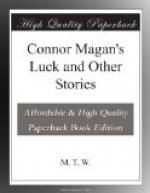But the delight of Connor’s life was to “catch the first wave” from a big steamer. Dennis Maloney was his comrade in this perilous game. They rowed their egg-shell of a boat close to the wheel. Drenched with spray—for a moment they felt the wild excitement of danger. Four alert eyes, four steady hands kept them from being sucked under—then came the triumph of meeting the first wave that left the steamboat, and the extatic rocking motion of the skiff as she rode the other waves in the wake—but to catch the first was the point in the frolic! Connor was known to many of the pilots as an adept in “catching the first wave.” Sometimes he was “tipped” by an unlooked for motion of the machinery, but was as certain as an india-rubber ball to rise to the surface, and a swim to shore was but fun to the young Magan.
In the house, Mother Maggie was happy when little Mike was tied in his chair, and a bar put in the doorway to keep him from crawling into the attractive water, if he should break loose; and when the door was bolted on the railroad side, he was allowed to gaze through the window at the engines smoking and thundering by all day, and fixing each blazing red eye on him at night—an entrancing spectacle to the child. And when the still younger Pat was tucked up in bed sucking a moist rag, with sugar tied up in it, her world was all right, and at rest.
But it would have taken a person of considerable penetration, or as Maggie said one who knew all “the ins and the outs” to see the peculiar good luck of this day. The water was swashing round within a few feet of the door. Some of the workmen had moved their beds to the space between the tracks, which was piled up with kitchen utensils, and looked like a second-hand store.
In these days of devotion to antiques, we hear dealers in such wares say that things are more valuable for being carefully used. This would not apply to Twinrip’s relics. The poor shabby furniture looked more than ever dilapidated in the open daylight. The social air of a home that was lived in, pervaded this temporary baggage-room between the tracks. One child was asleep in a cradle, others were eating their coarse food off a board. When a sprinkling of rain fell, an old grandmother under an umbrella fastened to a bed-post went on knitting, serenely.
Youngsters who needed rubbers and waterproofs about as much as did Newfoundland dogs, enjoyed the fun. One four-year old, sitting on a tub turned upside down, was waving a small flag, a relic of the Fourth of July—and looking as happy and independent as a king.
It took all his wife’s hopeful eloquence to comfort Tim. There was no water in Tim’s cellar, because he had no cellar. The cow, their most valuable piece of property, was taken beyond the tracks up on the hillside, and fastened to a stake in a deserted vineyard. If the worst came to the worst, and they were drowned out of house and home, their neighbors were no better off, and they would all be lively together. That was the way Maggie put it.




